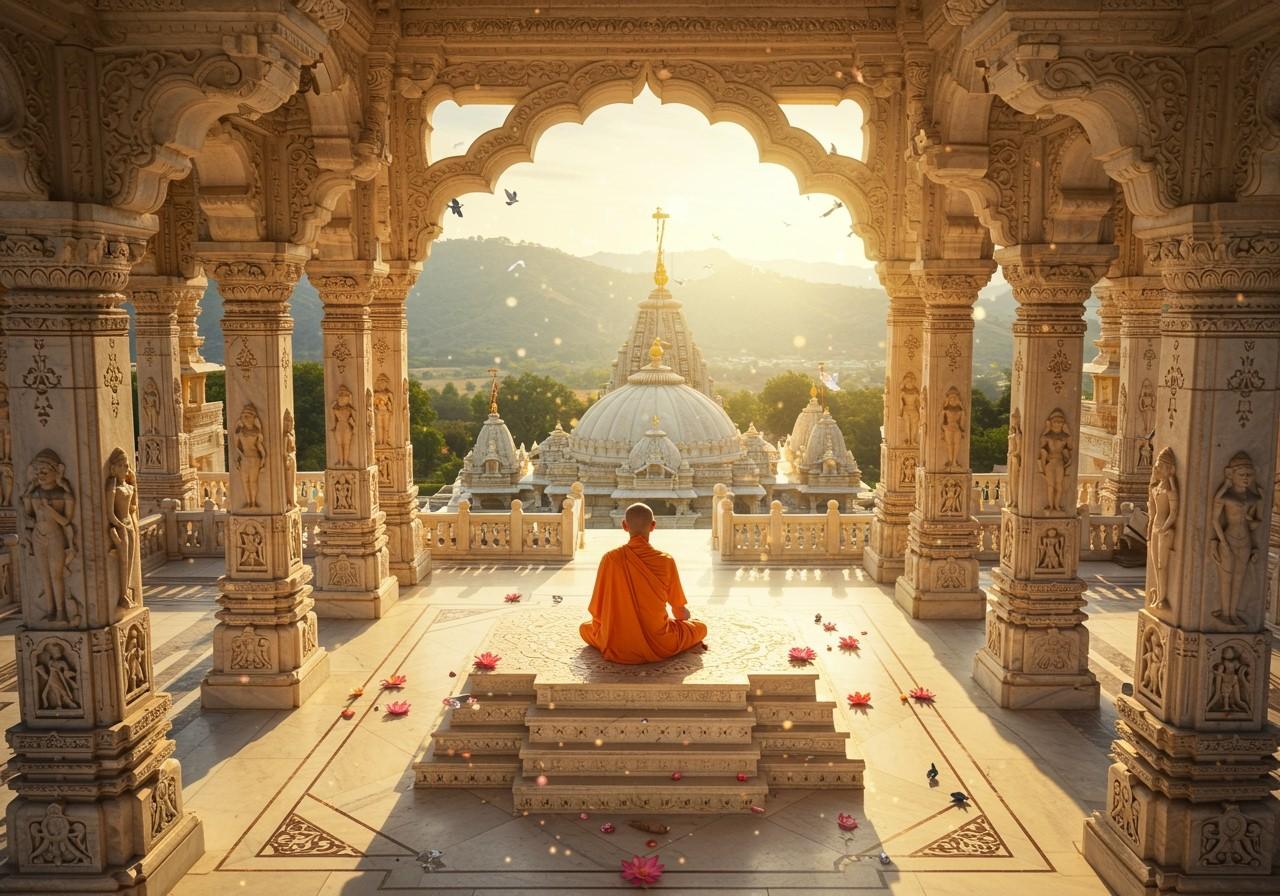
The Dilwara Temples, nestled near Mount Abu, Rajasthan, are a breathtaking fusion of spirituality and architecture. These Jain temples hold profound significance for the Jain community, reflecting their beliefs, practices, and rich history. These exquisite marble structures are not merely places of worship; they are a testament to the enduring principles of Jainism and a beacon of cultural heritage.
Understanding the Principles of Jainism
Jainism rests upon core tenets that guide the lives of its adherents. Ahimsa, the principle of non-violence, is paramount, influencing everyday actions to minimize harm to all living beings. Aparigraha, the practice of non-attachment to material possessions, encourages a minimalist lifestyle. Anekantavada promotes understanding diverse perspectives and fosters tolerance. The concept of Karma is central, shaping ethical behavior and spiritual development. Jain monks adhere to the Five Vows (Mahavratas), while laypersons observe lesser vows known as Anuvratas, fostering a harmonious and disciplined life.
The Architectural and Artistic Splendor of the Dilwara Temples
The Dilwara Temples, dating back to the 11th and 13th centuries, are architectural marvels crafted from exquisite marble. Visitors are captivated by the intricate carvings and ornate ceilings. Each temple possesses a unique story and significance.
Vimal Vasahi Temple
Commissioned by Vimal Shah in the 11th century, the Vimal Vasahi Temple is dedicated to Lord Adinath, the first Jain Tirthankara. The craftsmanship is awe-inspiring, with meticulous detail in every carving, from pillars to domes. The ceilings depict captivating scenes from Jain mythology, leaving visitors spellbound.
Luna Vasahi Temple
Built in the 13th century, the Luna Vasahi Temple is dedicated to Lord Neminath, the 22nd Tirthankara. Its exquisite pillars, adorned with lace-like carvings, are a sight to behold. The temple’s intricate details and artistic beauty rival the Vimal Vasahi.
Other Notable Temples within the Dilwara Complex
The Dilwara complex includes three other significant temples: Pithalhar, dedicated to Lord Rishabhanatha; Parshvanath, dedicated to Lord Parshvanatha; and Mahavir Swami, dedicated to Lord Mahavira. Each temple possesses unique charm and narrates a different chapter of Jain history. The marble sculptures within these temples embody deep spiritual symbolism, essential for understanding Jain beliefs.
Preservation: Safeguarding a Cultural Legacy
Preserving the Dilwara Temples is paramount. These temples are not only spiritual sanctuaries but also cultural treasures. Ongoing efforts focus on maintaining their structural integrity and artistic legacy for future generations.
Cultural Significance of the Dilwara Temples
The Dilwara Temples are more than just places of worship; they are a cultural beacon for Jains and beyond, attracting pilgrims and visitors globally.
A Source of Inspiration
The temples inspire reflection on Jain values like non-violence and humility, encouraging visitors to contemplate their own lives and the principles of Jainism.
Promoting Tourism and Cultural Exchange
The Dilwara Temples significantly contribute to Rajasthan’s cultural tourism, attracting visitors interested in art, history, and spirituality, and promoting awareness of Jain heritage, fostering communal harmony and interfaith dialogue.
Educational Initiatives and the Jain Museum
The on-site Jain museum, housing over 8,000 manuscripts, supports educational initiatives to disseminate Jain teachings, offering a wealth of knowledge on Jain philosophy and history.
How Poojn.in Supports Jain Religious Practices
Poojn.in offers a wide selection of authentic Jain puja items for both daily rituals and special ceremonies. Explore our collection of Bel malas, perfect for chanting and meditation, or browse our Tulsi malas, known for their spiritual significance. We also offer a variety of murtis, including Adiyogi and Radha-Krishna, to enhance your home shrine.
Our commitment to authenticity ensures all products align with Jain principles of ahimsa and purity. Visit Poojn.in today to discover how we can support your Jain religious practices.
Conclusion: An Enduring Legacy of Art and Spirituality
Visiting the Dilwara Temples is a transformative experience, seamlessly blending art, spirituality, and history. These temples are not merely architectural wonders; they are gateways to understanding the profound values of Jainism. By preserving their beauty and promoting their significance, we honor a legacy that continues to inspire. Whether seeking spiritual growth, cultural enrichment, or simply the joy of witnessing timeless artistry, the Dilwara Temples offer an unforgettable journey, inviting us to appreciate the enduring beauty of India’s diverse traditions and the wisdom they hold.


